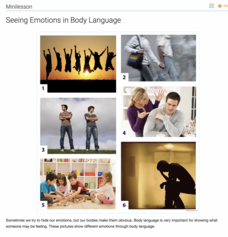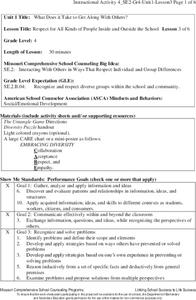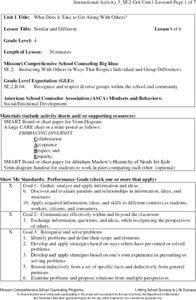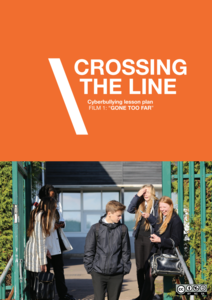Ophelia Project
Let’s Be Friends
Introduce positive social skills and friendship to young learners with this wonderfully designed eight-lesson unit. It includes several activities to help learners identify positive attributes, build empathy, and understand the qualities...
Anti-Defamation League
Dealing with the Social Pressures that Promote Online Cruelty
Why do people engage in cyberbullying? What can be done about it? These are the questions middle schoolers consider in a very timely lesson. Participants view PSA announcements, read a case study, and participate in scenarios designed to...
Teaching Tolerance
Participating in Digital Communities
It's possible to promote inclusion and empathy on the Internet—it just takes effort! Scholars read and discuss a short story about being a friend online. Then, pupils role-play appropriate ways to respond to hate within a digital...
Nemours KidsHealth
Empathy: Grades K-2
Second graders read articles about being afraid, dealing with anger and apologizing. In this feelings instructional activity, 2nd graders read articles and discuss the feelings they have. Students describe their feelings and how to be...
US Institute of Peace
Becoming a Peacebuilder
"Be the change you wish to see in the world!" The 15th and final lesson in a peacebuilding series uses this quote from Gandhi to prepare pupils for their own action projects. Individuals research a global issue, then brainstorm a method...
Overcoming Obstacles
Resolving Conflicts
A activity about resolving conflicts guides young scholars through the process of identifying emotions and reflecting on the situation, all before taking action. The activity encourages class members to stay open-minded and listen to the...
Thoughtful Learning
Seeing Emotions in Body Language
Scholars test their skills of reading body language with a collaborative learning experience that focuses on showing and identifying emotions. Pairs take turns acting out an emotion, one uses body language while the other guesses what...
Health Smart Virginia
Social Emotional Skills
A list of activity ideas, lessons, and resource links all focus on kindness, empathy, and mindfulness. Five steps offer experience in role-play, crafts, writing, thoughtful discussions, and more!
Folger Shakespeare Library
Essential Everyday Bravery
Shakespeare's plays may be old, but they still have relevant lessons for today's world! A collection of lesson plans uses examples from The Merchant of Venice and District Merchants to teach about bravery. In addition to learning...
Partners Against Hate
Building Community and Combating Hate
Put a little love in your classroom! Help middle school scholars understand differences among people and build a sense of community within their school through 10 well-organized lessons. Each unique lesson incorporates writing,...
Museum of Disability
Don't Call Me Special
Introduce young learners to the idea of disabilities and making friends with children who are different than they are. Using Don't Call Me Special - A First Look at Disability by Pat Thomas, learners are guided through the new vocabulary...
Humane Education Advocates Reaching Teachers
Justice for All - Educating Youth for Social Responsibility: Grades 6-8
Teach middle schoolers how to develop healthy relationships with activities and lessons designed to create a kind and inclusive
classroom. Pupils create guidelines to develop a safe and civil learning environment. They learn how to...
Health Smart Virginia
Relationship Skills and Communication
Relationship and communication skills are the heart of a lesson that focuses on passive, aggressive, and assertive communication. After examining examples of each type, teams develop an assertive, win/win solution that resolves a conflict.
Facing History and Ourselves
Protesting Discrimination in Bristol
Using the Bristol Bus Boycott as a case study, class members examine the strategies and levels of power protesters used to effect change. The two-day instructional activity concludes with individuals reflecting on the actions they might...
Western Justice Center
Underlying Needs
Conflicts arise when underlying needs are unmet. An engaging video introduces viewers to nine basic human needs. Then, through a series of videos, worksheets, and activities, class members learn that by focusing on interests and needs,...
Florida Department of Health
Exploring Healthy Relationships Unit
A four-lesson unit on healthy relationships begins by helping individuals develop a positive sense of self-worth by identifying their own positive characteristics. Participants also examine data from the YRBS Online Tool about the...
Amani Project
Harmony Break! Finding Emotions With Music
Gather the entire family (or class members) for a fun Harmony Break! A volunteer thinks of a color from their Mood Meter that they will express by singing, playing an instrument, or performing a dance. After the performance, the audience...
Museum of Disability
Stand in My Shoes
Stand in My Shoes, a story by Bob Sornson, is an effective way to teach young learners about empathy and making friends. Once pupils read through the story, they answer a series of discussion questions and complete reading activities...
Missouri Department of Elementary
Respect for All Kinds of People Inside and Outside the School
Why is it important to embrace diversity? Scholars explore the topic by learning about the CARE acronym: Collaboration, Acceptance, Respect, Empathy. They also complete a diversity puzzle worksheet and play a collaborative game that...
Museum of Disability
Rolling Along
Kindness and empathy can be as important as reading comprehension skills, especially for younger learners. Reinforce both with a instructional activity based on Rolling Along: The Story of Taylor and His Wheelchair by Jamee Riggio...
Anti-Defamation League
Sixty Years Later
Has any progress been made in desegregating schools since 1954's Supreme Court case Brown v. Board of Education? To find out, class members examine charts and graphs representing U.S. schools' racial, ethnic, and socioeconomic...
Missouri Department of Elementary
Similar and Different
Using a Venn diagram, pupils compare the similarities and differences between two classmates. Next, they review the CARE acronym (Collaboration, Acceptance, Respect, Empathy) and discuss how it applies to diversity in the classroom.
Curated OER
Exploring Emotions Through Activities
You'll definitely want this rich compilation of worksheets and activities in your toolbelt as you review and discuss the range of emotions we have as human beings. Activities include defining feelings, identifying ways we express...
Childnet International
Crossing the Line: Cyberbullying
Members of the LGBTQ community are more likely to be bullied online than their peers—and bystanders who do nothing can be as problematic as the bullies themselves. Middle schoolers explore ways to protect themselves and others on the...

























